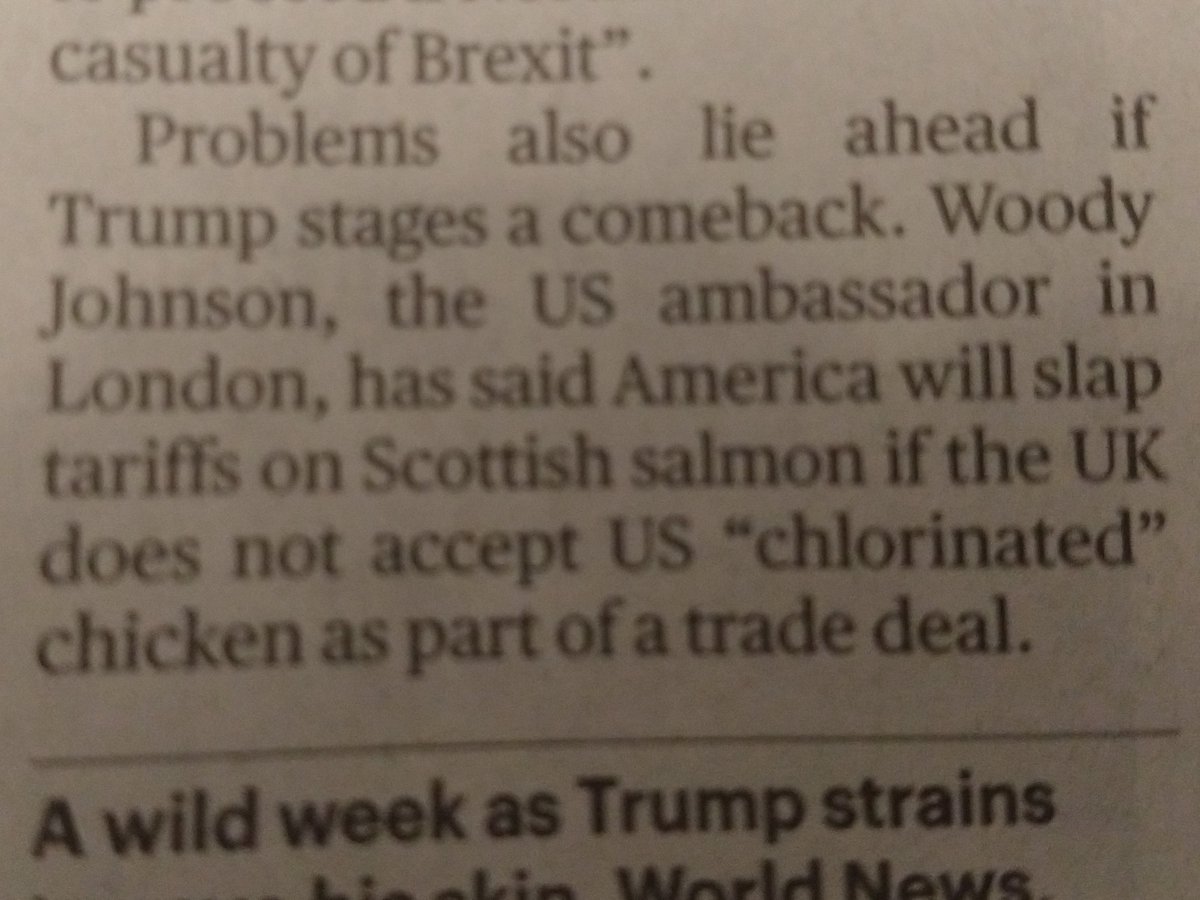So much being written today about UK food and trade, so time for the thread. In short, factually:
- reasonable for the US to want us to accept their food
- reasonable (& broadly WTO compliant) for us to set conditions
- the lack of evidence, plus distractions, is troubling 1/
- reasonable for the US to want us to accept their food
- reasonable (& broadly WTO compliant) for us to set conditions
- the lack of evidence, plus distractions, is troubling 1/
Start with the reason we& #39;re having a food and trade debate, easy to forget when distractions are thrown in around protectionism and developing countries. The US want as a price for a trade deal a guarantee their food can be sold in the UK (i.e. repeal any current bans). 2/
The US are behaving in trade talks just like the EU. As the bigger player, an insistence on their rules. A sign of our debased UK debate is that few make this equivalence, or indeed ask why the UK doesn& #39;t do similar to smaller countries? 3/
So, easy question for the UK (though not an easy answer). Is it worth changing our food standards to get a US trade deal. Again, this is the question we should be debating in the first instance, not being distracted. And the UK public have views... 4/ https://twitter.com/sophgaston/status/1315589230488432641">https://twitter.com/sophgasto...
The food and trade debate in the UK gets weird when it comes to impact. Because there& #39;s no comprehensive assessment. Does it really mean cheaper food, or will it put farmers out of business, or threaten environmental degradation? We don& #39;t know. 5/
Instead of evidence, proponents of a US trade deal tend to say restrictions on food imports will be protectionist, hit developing countries, and are against WTO rules. All are frankly dubious. 6/ https://twitter.com/CapX/status/1315565440513515522">https://twitter.com/CapX/stat...
Half of trade twitter has spent the last five days debating the extent to which restrictions on imports based on production methods are WTO compliant. Good to keep them busy. On balance, yes, the UK can have rules on imports. 7/ https://twitter.com/DavidKleimann/status/1314428004152627202">https://twitter.com/DavidKlei...
So, the UK can if we want put in place rules on what food we import beyond what is safe. They have to be well designed. And not probably if we also want a US trade deal. But issues like animal welfare, antibiotics, climate change could be covered. But at what cost? 8/
So is putting in place rules on imports protectionist and hitting developing countries worst? Given all countries have extensive regulations on everything, the idea that such rules are by nature protectionist seems wrong. But they should be designed to minimise trade impact. 9/
Developing countries? Well for a start we should be aware that doing trade deals with developed country agriculture exporters is bad for developing countries, who lose the advantage of having zero tariffs. So not a great argument for a US trade deal. 10/
Developing countries already have to meet many rules and regulations to export, so a lot will depend on how any new ones are implemented, but in general it should be noted that exporters often produce to high standards (and in many cases are multinational owned). 11/
So back to the UK. The choice as it turns out is ours. If we care enough about animal welfare, over-use of antibiotics, have concerns about some treatments, we can set rules. If we don& #39;t care that much, we could let others like the US set our rules. 12/
The obvious answer was and still is to set up a proper body to examine trade and food - and the Trade and Agriculture Commission is due to report in January but needs more time and wider membership. It attracted a shadow body who have reported today... https://www.sustainweb.org/resources/files/reports/FBSC_Maintaining_UK_food_standards_embargo_12-10-20.pdf">https://www.sustainweb.org/resources... 13/
The next answer then is for MPs to be able to express a broad opinion one way or other as to concerns - this is exactly the kind of issue needing Parliamentary debate. It is a shame this isn& #39;t really on offer (more on scrutiny from NFU in article...) https://www.conservativehome.com/platform/2020/10/minette-batters-today-mps-should-insist-on-better-scrutiny-arrangements-for-future-trade-deals.html">https://www.conservativehome.com/platform/... 14/
In the event of a Biden win we probably have more time, as it would then be hard to see a UK-US trade deal for a couple of years. If Trump wins, it seems the US is already threatening that we must accept their food. So immediate problems. 15/
Most of all to set UK trade policy, in particular on food, we need more facts and less hiding and diversion. We have the power now as the UK to set our own food rules. If we want to give that away again, to who, wy, and with what impact. We still don& #39;t know. 16/ end

 Read on Twitter
Read on Twitter


